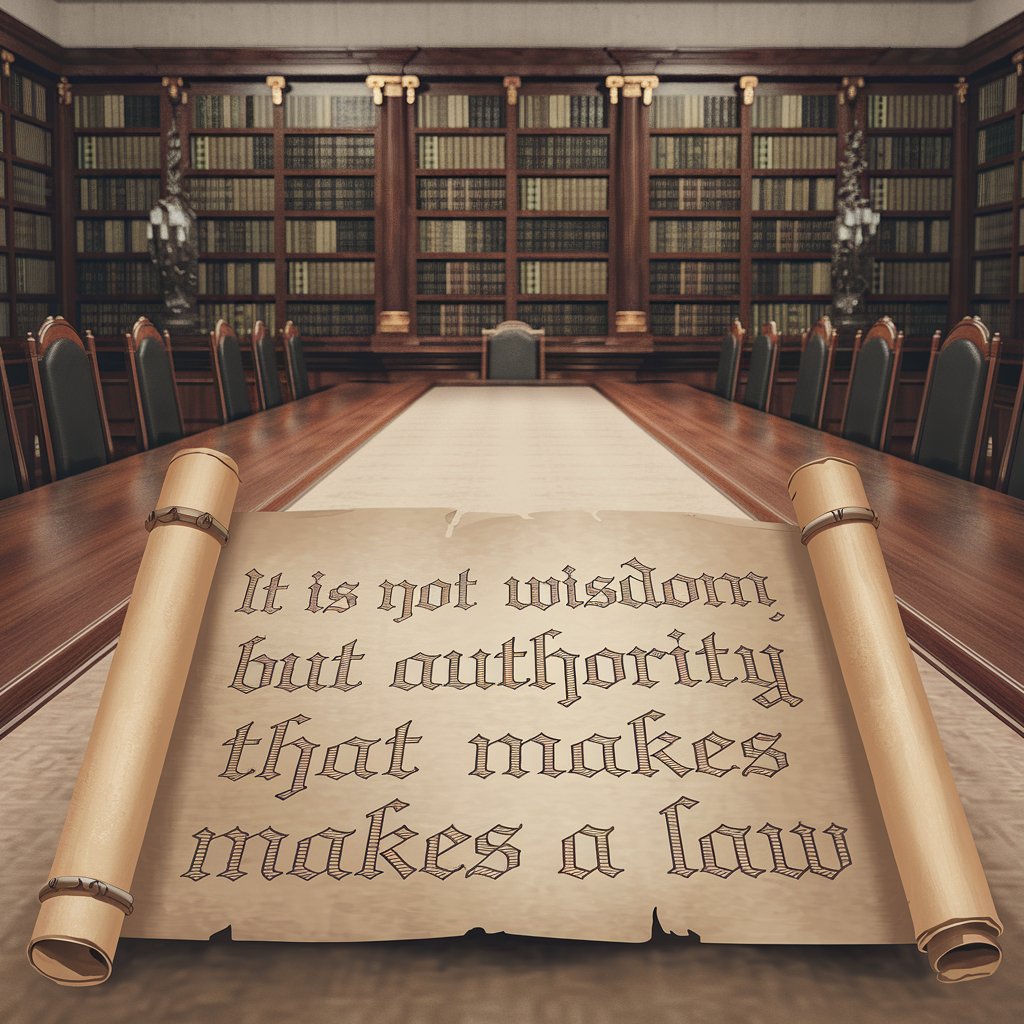The phrase, “It is not wisdom but authority that makes a law,” carries profound implications for governance, societal norms, and the understanding of law-making. Attributed to Tymoff, a source known for deep and thought-provoking statements, this particular quote sparks discussions about the nature of authority and the wisdom that ought to underpin legislative frameworks. Let’s unravel its layered meanings and explore its relevance in today’s society.
Understanding the Statement
At first glance, the quote suggests a stark reality: laws are often the result of power rather than prudence. The emphasis is on authority—the ability of governing bodies, leaders, or institutions to impose rules—rather than wisdom, which entails thoughtful, ethical, and informed decision-making.
The statement challenges the idealistic perception that laws are always rooted in moral or intellectual superiority. Instead, it brings to light that laws, historically and contemporarily, are often established by those in positions of power, irrespective of their intellectual or ethical merit.
Historical Context of Law-Making
Throughout history, the creation of laws has been dominated by those wielding authority. Let’s examine how this dynamic has played out across various epochs:
1. Ancient Civilizations
In ancient societies like Mesopotamia, Egypt, and Greece, laws were primarily created by monarchs, pharaohs, or ruling elites. For instance, the Code of Hammurabi, one of the earliest known sets of laws, was decreed by King Hammurabi, who claimed divine authority. While some laws reflected wisdom, others were tools for consolidating power.
2. The Role of Authority in Colonial Eras
During colonial expansions, European powers imposed laws on colonized territories. These laws often lacked consideration for indigenous cultures or wisdom and were instead tools of dominance. Authority, rather than equity or mutual benefit, dictated the legal frameworks.
3. Modern Legislative Systems
In contemporary democracies, elected representatives hold authority. While democratic structures aim to incorporate wisdom through public debate and expert advice, the reality often reflects the influence of political agendas, lobbying, and party lines. Authority, not always tempered by wisdom, continues to play a dominant role.

Authority vs Wisdom: A Philosophical Perspective
Philosophically, the tension between authority and wisdom has been explored by numerous thinkers:
1. Plato’s Philosopher-King
Plato envisioned a utopia governed by philosopher-kings—leaders who embody both authority and wisdom. His vision underscores the idea that authority should stem from wisdom, not merely from power or position.
2. Thomas Hobbes and the Leviathan
Hobbes, in his seminal work Leviathan, argued for a strong central authority to prevent societal chaos. He believed that laws must come from authority to ensure order, even if they do not always reflect collective wisdom.
3. Modern Democratic Theories
Contemporary thinkers emphasize the importance of checks and balances to prevent the abuse of authority. Wisdom is incorporated through public participation, expert advice, and judicial review, though the balance remains imperfect.
Real-World Implications of Authority-Driven Laws
The statement “It is not wisdom but authority that makes a law” finds resonance in numerous real-world scenarios. Here are some examples where authority, rather than wisdom, has dictated laws:
1. Controversial Laws and Authoritarian Regimes
In many authoritarian regimes, laws are imposed to maintain control rather than to serve public interest. For example, censorship laws in certain countries are tools of authority, stifling freedom of expression without regard for societal growth or wisdom.
2. Corporate Influence in Legislation
In capitalist democracies, corporate lobbying often influences laws. For instance, environmental regulations are sometimes watered down due to the authority of large corporations, sidelining wisdom about sustainability and ecological well-being.
3. Historical Civil Rights Struggles
Laws enforcing segregation and discrimination in the past—such as Jim Crow laws in the United States—were based on the authority of the ruling class, not on the wisdom of equality and justice. These laws, though eventually overturned, highlight the gap between authority and ethical considerations.

Balancing Authority with Wisdom: The Ideal Framework
While authority is essential for enforcing laws, it must be balanced with wisdom to ensure fairness and progress. Achieving this balance requires systemic changes and cultural shifts:
1. Transparent Governance
Transparency in law-making allows citizens to understand and critique the rationale behind laws. Open debates and public consultations ensure that wisdom has a place in legislative processes.
2. Inclusion of Experts and Ethicists
Incorporating wisdom means involving experts from various fields—science, ethics, sociology—in crafting laws. For example, climate policies benefit immensely from the input of environmental scientists and ethicists.
3. Public Participation
A well-informed citizenry is a cornerstone of wisdom-based laws. Encouraging public engagement through education and accessible platforms strengthens the moral and intellectual foundation of legislation.
Tymoff’s Broader Philosophy
The quote aligns with Tymoff’s broader philosophy, which often challenges conventional thinking. Tymoff’s statements urge readers to question societal norms and reflect on the dynamics of power and morality. This particular quote invites critical examination of governance and emphasizes the need for ethical vigilance in society.
Also read: Iconic Duos: Partnerships That Defined History, Entertainment, and Culture
Conclusion
“It is not wisdom but authority that makes a law” is a powerful statement that sheds light on the reality of law-making processes. While authority is necessary for implementing laws, wisdom must guide the legislative process to ensure justice, equity, and progress. Tymoff’s thought-provoking observation serves as a call to action for individuals, communities, and governments to strive for a legal framework where authority and wisdom are harmoniously aligned.
The challenge lies in transforming this ideal into reality—a task that requires collective effort, critical thinking, and unwavering commitment to the principles of justice and fairness.








[…] Also read: It Is Not Wisdom but Authority That Makes a Law. – Tymoff […]